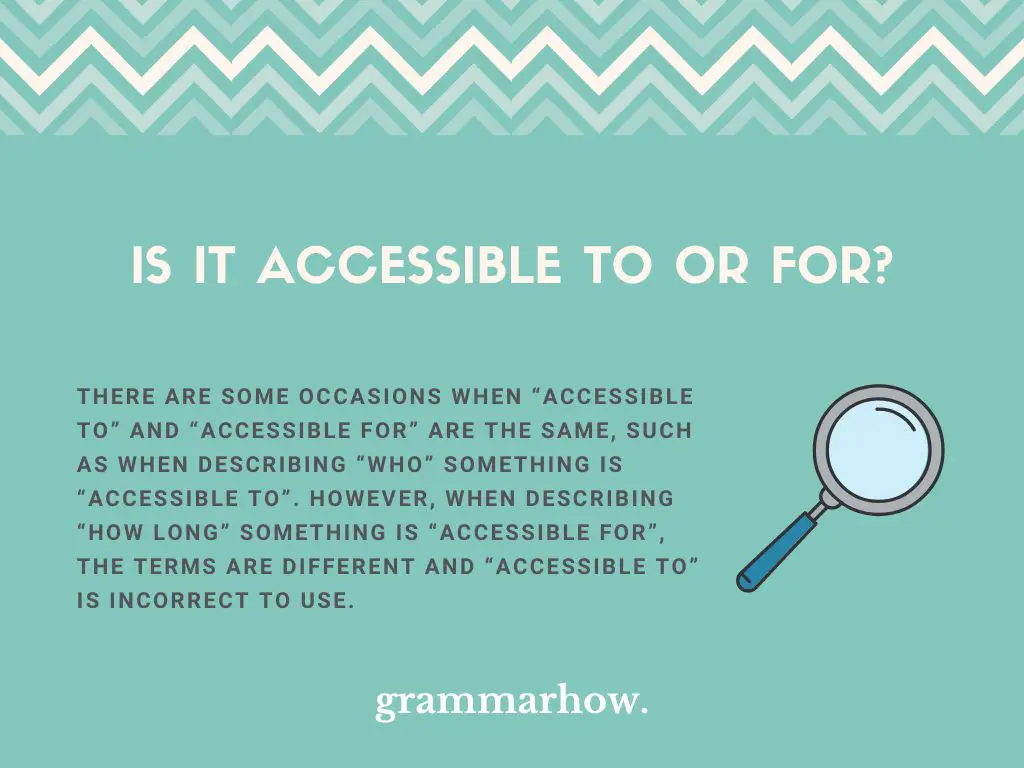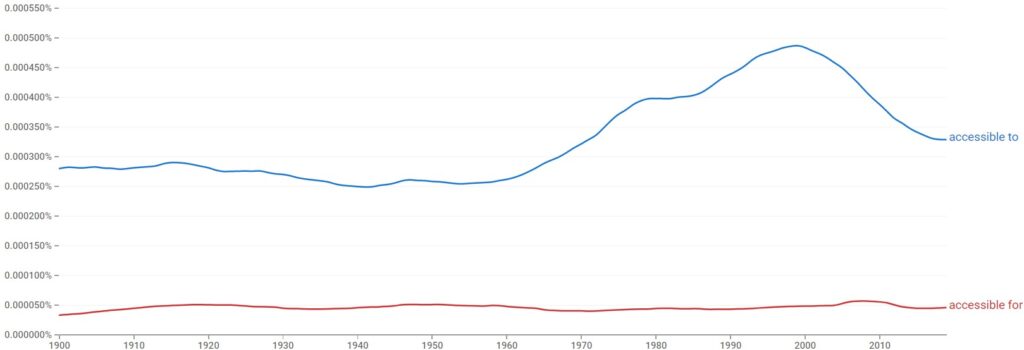The terms “accessible to” and “accessible for” may look similar. Still, there are some subtle differences that this page will explain and highlight through examples and an explanation of the difference of changing the preposition.
Is It Accessible To or For?
There are some occasions when “accessible to” and “accessible for” are the same, such as when describing “who” something is “accessible to”. However, when describing “how long” something is “accessible for”, the terms are different and “accessible to” is incorrect to use.

The Cambridge Dictionary states that “accessible” relates to how easily understood or reached something is or how possible it is to enter or use something. Therefore, if something is “accessible to” a group of people, it means it is available or possible for them to use, or it refers to how “easy” something is to access or use.
The term “accessible for” can often be used to replace “accessible to”, but the latter option is the more common.
However, there are occasions when “accessible to” and “accessible for” are different, such as when referring to how long something is “accessible for.”
Here are some examples that show “accessible to” and “accessible for” in a sentence:
Same meaning
- The pool is accessible to/for all hotel guests.
- The website is accessible to/for UK residents only.
Different meaning
- The show will be accessible for two weeks only.
- The early bird online ticket sales will be accessible for two hours tomorrow afternoon.
Accessible To
The term “accessible to” refers “to whom” certain places or services are available. Furthermore, as the Collins Dictionary states, it can also mean something “likely to be affected by” something else.
There are times when “accessible to” can replace the term “accessible for”; however when referring to “how long” something is “accessible for”, the word “accessible to” cannot replace it.
Here are some examples of “accessible to” in a sentence:
- Low salaries for police in developing countries mean they are accessible to bribery.
- The new program is accessible to any member of the community.
- The mountain pass was not accessible to members of the public because of the snow.
- The website was not accessible to anyone in Russia.
- The party is only accessible to ticket holders.
- The upper rungs of society are not accessible to people like you and me.
Accessible For
The term “accessible for” can have two meanings. The first is the same as “accessible to” and means “to whom” is something available or “how easy” something is to access.
The second meaning is for “how long” is something accessible, in which case the term “accessible to” cannot be used to replace it.
Here are some examples of “accessible for” in a sentence:
First meaning:
- The team is accessible for/to all members of the sports faculty.
- The offices won’t be accessible for/to staff on Friday due to renovations.
- Mental health services need to be made accessible for/to those who need them.
Second meaning:
- The exhibition will only be accessible for a month.
- I will only be accessible for a short time this afternoon.
- Some natural beauty spots will not be accessible for long if climate change continues.
Accessible From
The term “accessible from” essentially has two meanings. The first is to say “from where” is another place accessible. In comparison, the second is to say “from when” is something accessible.
It is different from the term “accessible to”, which means “to whom” access is provided.
Here are some examples of how to use “accessible from” in a sentence:
Meaning 1
- The building is accessible from the roof if you are rich enough to own a helicopter.
- The garden is only accessible from the back door. There is no side passage.
- Central London is easily accessible from all surrounding airports.
Meaning 2
- The pool is accessible from 8 am.
- The new metro service will be accessible from Monday 1st August.
- The coastal path won’t be accessible from next week onwards because they are building new houses.
Which Is Used the Most?
The Google Ngram Viewer shows that “accessible to” has always been much more common than “accessible for.”

The term “accessible to” has also grown substantially in frequency since 1990, whereas “accessible for” has remained constant. There is also no difference between American and British English in terms of frequency, with both showing almost precisely the same trend.
Final Thoughts
The terms “accessible to” and “accessible for” are synonyms when referring to “whom” something is available to or “how easy” it is to access. However, when referring to “how long” something is “accessible for”, the term “accessible to” is incorrect.

Martin holds a Master’s degree in Finance and International Business. He has six years of experience in professional communication with clients, executives, and colleagues. Furthermore, he has teaching experience from Aarhus University. Martin has been featured as an expert in communication and teaching on Forbes and Shopify. Read more about Martin here.

